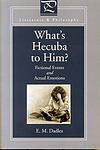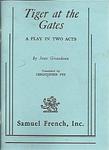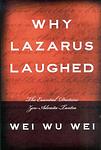The Greatest "Ancient Greece, Plays" Books of All Time
Click to learn how this list is calculated.
This list represents a comprehensive and trusted collection of the greatest books. Developed through a specialized algorithm, it brings together 300 'best of' book lists to form a definitive guide to the world's most acclaimed books. For those interested in how these books are chosen, additional details can be found on the rankings page.
Genres
Plays are a category of literature that consists of written works intended for performance on stage. They typically feature dialogue between characters and are structured into acts and scenes. Plays can be comedic, tragic, or a combination of both, and often explore themes such as love, power, and morality. They are meant to be performed by actors in front of an audience, and can be enjoyed both as written works and as live performances.
Countries
Date Range
Reading Statistics
Click the button below to see how many of these books you've read!
Download
If you're interested in downloading this list as a CSV file for use in a spreadsheet application, you can easily do so by clicking the button below. Please note that to ensure a manageable file size and faster download, the CSV will include details for only the first 500 books.
Download-
1. Electra by Sophocles
"Electra" is a classic Greek tragedy that revolves around the character of Electra and her thirst for revenge. After her father, the king, is murdered by her mother and her mother's lover, Electra and her brother, Orestes, plot to avenge their father's death. The story is a complex exploration of justice, vengeance, and familial duty, depicting Electra's struggle between her desire for revenge and the moral implications of matricide.
-
2. Hippolytus by Euripides
"Hippolytus" is a tragic play that revolves around the themes of lust, revenge, and the wrath of the gods. The story follows the character Hippolytus, a dedicated follower of the goddess Artemis, who spurns the advances of his stepmother Phaedra. In a fit of jealousy, Phaedra falsely accuses Hippolytus of rape, leading his father Theseus to curse him. The resulting divine punishment and misunderstandings lead to the tragic deaths of both Hippolytus and Phaedra, revealing the devastating consequences of deceit and the unforgiving nature of the gods.
-
3. Alcestis by Euripides
"Alcestis" is a Greek tragedy that tells the story of a queen who voluntarily chooses to die in place of her husband, the king, when he is fated to die early. The king's friend, Heracles, visits them and, unaware of the queen's death, is offended that he is not being properly entertained. Upon learning the truth, he fights and defeats Death to bring the queen back to life, restoring happiness to the royal household. The play explores themes of love, sacrifice, death, and the power of friendship.
-
4. Hecuba by Euripides
The tragedy centers on the sorrow and vengeance of a queen who has lost her city, her husband, and her children to war. After the fall of Troy, she becomes a slave to the Greeks and faces the ultimate horror of witnessing the sacrifice of her daughter and the brutal murder of her last surviving son. Her grief transforms into a dark quest for retribution, leading her to take justice into her own hands, which raises profound questions about morality and the limits of human suffering.
-
5. The Frogs by Aristophanes
"The Frogs" is a classic comedic play that delves into the world of Greek mythology and literature. The story follows the god Dionysus as he descends into the underworld with his slave Xanthias. Dionysus seeks to bring back the recently deceased tragedian Euripides to save the city from its cultural decline. However, upon arrival, he finds himself amidst a heated debate between Euripides and Aeschylus, another deceased playwright, over who is the greatest tragedian. A competition ensues, judged by Hades, leading to a series of humorous critiques of their plays and styles. The play is a satirical examination of Athenian society and the role of art and culture, filled with witty dialogue and commentary on the nature of theater.
-
6. Tiger At The Gates by Jean Giraudoux
"Tiger at the Gates" is a play that presents a pacifist perspective on the Trojan War, focusing on the character of Hector, a Trojan military leader who foresees the destruction that war with Greece will bring. Despite his efforts to avoid conflict through diplomacy and reason, he is met with ridicule and pressure from his fellow Trojans, who are eager for battle and glory. The narrative explores themes of fate, individual versus collective responsibility, and the tragic consequences of war, as Hector's attempts to maintain peace ultimately fail, leading to the inevitable fall of Troy.
-
7. Andromache by Jean Racine
The play is a tragic drama set in the aftermath of the Trojan War, focusing on the fate of Andromache, the widow of the Trojan hero Hector, who is now a captive of Pyrrhus, the son of Achilles. Pyrrhus is torn between his obsessive love for Andromache, who remains faithful to the memory of her slain husband, and his betrothal to Hermione, the daughter of the Spartan king Menelaus. The play explores themes of love, duty, and vengeance as Andromache struggles to protect her son, the last heir of the Trojan line, amidst the dangerous political machinations of the Greek victors, leading to a series of tragic events fueled by jealousy, pride, and the inescapable grip of fate.
-
8. Lazarus Laughed by Eugene O'Neill
"Lazarus Laughed" is a play that explores the transformation of Lazarus after being raised from the dead by Jesus Christ. Rather than focusing on the miracle itself, the narrative delves into the profound psychological and spiritual change within Lazarus, who emerges from the tomb with an unshakable peace and a contagious laughter, signifying his transcendence over the fear of death. As he shares his newfound enlightenment with those around him, he faces both admiration and opposition, challenging the societal norms and religious dogmas of his time. The play is a philosophical meditation on the meaning of life and death, the power of joy, and the potential for human beings to live free from the paralyzing grip of fear.
-
9. Cyclops by Euripides
"Cyclops" is a satyr play that blends elements of comedy and tragedy, drawing from the mythological encounter between Odysseus and the titular one-eyed giant. The narrative follows Odysseus and his men as they become trapped in the cave of the Cyclops, a savage and uncivilized creature. Employing wit and cunning, Odysseus devises a plan to intoxicate the monster with wine and blind him, securing an escape for himself and his crew. The play explores themes of intelligence versus brute force, the struggle for survival, and the clever triumph of human ingenuity over monstrous barbarism.
Reading Statistics
Click the button below to see how many of these books you've read!
Download
If you're interested in downloading this list as a CSV file for use in a spreadsheet application, you can easily do so by clicking the button below. Please note that to ensure a manageable file size and faster download, the CSV will include details for only the first 500 books.
Download







